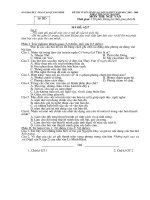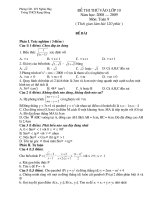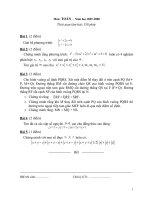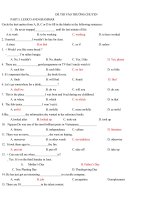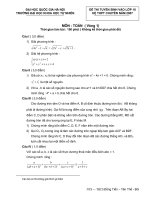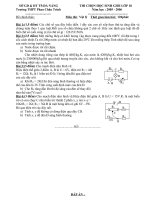De thi vao lop 10
Bạn đang xem bản rút gọn của tài liệu. Xem và tải ngay bản đầy đủ của tài liệu tại đây (110.24 KB, 8 trang )
<span class='text_page_counter'>(1)</span><div class='page_container' data-page=1>
<b>WRITTEN test 1</b>
<b>I. Chọn từ mà phần gạch chân có cách phát âm khác với các từ còn lại : (0,25/s)</b>
1. A. source B. shout C. sound D. found
2. A. chemistry B. character C. chemical D. change
3. A. prayed B. lived C. claimed D. worked
<b>II. Chän tõ cã träng âm chính khác với những từ còn lại: (0,25/s)</b>
1. A. thirteen B. thirty C. hundred D. Sunday
2. A. divide B. decide C. visit D. persuade
<b>III. Chọn phương án đúng để hoàn thành các câu sau : (0,25/s)</b>
1. The journey to the village was very (interesting/ interested/ boring/ bored). We enjoyed
it very much.
2. We should turn off the lights before leaving to (save/ protect/ increase/ consume)
Electricity
3. The traditional dress of (Vietnamese/ Portuguese/ Japanese/ Chinese) women is
Kimono
4. I wish there ( were/ are/ aren't/weren't) any natural disasters in our world.
5. Mai (tells/ is telling/ told/ has told) me that she would write an inquiry letter to that
English center.
<b>IV. Sử dụng thì thích hợp để chia các động từ trong ngoặc:(0,25/V)</b>
1. Look at those boys! What games they (play)?
2. Do you feel like (go) out for a change tonight.
3. I can't go out with you because I (not finish) my work.
4. Yesterday evening, my sister (be) tired, so she (go) to bed early.
5. My friend (crash) into a big tree last night while she (drive) home.
<b>V.Viết lại các câu sau bắt đầu phần gợi ý: (0,5/S)</b>
1. There isn't a river in my village. We can't go swimming every day.
=> If there ...
2. We began teaching at this school two years ago.
=> We have...
3.My close friend is a fluent English speaker.
=> My close friend speaks ...
4. He often watched live soccer matches on T. V but now he doesn’t.
=> He used...
5. Jimmy is too young to take part in this race.
=> Jimmy isn’t old...
<b>VI. Dùng từ gợi ý viết thành câu.(0,5/S)</b>
1. Although / rain/ heavy/ yesterday, we /go/ school.
...
2.This morning/ Jane/ wake up/ late/ so/ she/ not/ have/ time /for/ breakfast.
</div>
<span class='text_page_counter'>(2)</span><div class='page_container' data-page=2>
paragraph two or three times , then the second and so on . Then read the whole text from
beginning to end . Then you might want to read it all again. You will probably want to
read the complete text again after you have finished the whole lesson . Then test yourself
on the vocabulary words that you underlined when you first read the text and learn the
words you don’t know.
1. According to the passage , you can start reading a text in only one way.
2. You should read the sentence which contains the word you don’t know many times.
3. Memorizing sentences or paragraphs is a way to study reading
4. For the difficult text , you should read the first paragraph two or three times , then the
second and so on before reading from beginning to end.
</div>
<span class='text_page_counter'>(3)</span><div class='page_container' data-page=3>
<b>WRITTEN TEST 2</b>
<b>I. Chọn từ mà phần gạch chân có cách phát âm khác với các từ còn lại : </b>
<b>(0,25/s)</b>
1. A. book B. pool C. school D.
soon
2. A. great B. clean C. bean D.
weak
3. A. lazy B. sticky C. supply D.
baggy
4. A. household B. provide C. mobile D.
remote
<b>II. Chọn phương án đúng để hoàn thành các câu sau :</b>
<b> (0,25/s)</b>
1. Islam is the official (language/ religion/ region/ currency) of Malaysia.
2. When you learn English, you should have a dictionary to (look at/ look
after/ look for / look up) the new words.
3. You are interested in fashion so much, (are you/do you/aren't you/don't
you)?
4. Mount Pinatubo, a (earthquake/ typhoon/ volcano/ storm) in the
Philippines, erupted in 1991
5. Lee was born in China, so Chinese is his (foreign language/ mother
tongue/ second language).
6. Would you mind if I (turning/ turns/ turned/ am turning) on the TV now?
<b>III.Tìm và sửa một lỗi sai trong mỗi câu d</b>
<b> ới đây:(0, 25/s)</b>
1. Nobody have used this computer because it isn’t working
2. The weather was bad because we had to cancel our picnic .
3. I was born on March 1995.
4. There is two football matches on T.V tonight.
5. Did your house built a long time ago?
6. The power has been turned on yet
<b>IV.Viết lại các câu sau bắt đầu phần gợi ý: (0,5/S)</b>
1. " I am chatting with my American pen pal now," Peter said.
=>
Peter
said ...
2. The student are doing an exercise on passive voice at the moment.
=>
An
exercise ...
3. The last time I saw Jimmy was at Stephen’s party.
=>I
</div>
<span class='text_page_counter'>(4)</span><div class='page_container' data-page=4>
=>
The
book
which...
5. Mai is a hard-working students.
=> Mai
studies...
<b>V.Sắp xếp từ xáo trộn thành câu hoàn chỉnh.(0,5s)</b>
1.were/ designer/ wish/ you /Do/ a / fashion / you/ ?
...
...
2. like/ they/ don’t / Most/ casual clothes/ ,/ wearing/ students ?
...
...
<b>VI. Đọc đoạn văn dưới đây và tìm một từ thích hợp để điền vào chỗ</b>
<b>trống.(0,5/w)</b>
</div>
<span class='text_page_counter'>(5)</span><div class='page_container' data-page=5>
<b>WRITTEN TEST 3</b>
<b>I. Chọn phương án đúng để hoàn thành các câu sau : (0,25/s)</b>
1. That is the girl (who/ that/ whose/ which) brother won an Olympic gold medal.
2. Would you mind if I (turning / turns / turned/ am turning) on the TV now?
3. The new school hall, (that/ where/ which/ whose)can hold 500 people, will be ready
Next week.
4. Mr. Tran was out when I came,( so/ so that/ because/ although) I left a message for
him.
5. He worked effectively.(However/ Therefore/ Because/ although), he was paid very
high
6. Minh asked me what he ( has to/ had to/ will/ can) do.
7. Wearing uniforms on Monday and Thursday is (comfortable/ compulsory/ national/
official) for all students in our school
8. You do not have to take part in this class if you do not like. It is (necessary/ optional/
important/ interesting ).
9. All the teachers in this foreign language centre are (badly-qualified/ well- qualified/
badly-qualifying/ well-qualifying).You should learn English here.
10. Today TV (seers/ looker /viewers/ watchers) can watch a lot of interesting local and
international programs
<b>II.Tìm và sửa một lỗi sai trong mỗi câu d ới đây:(0, 25/s)</b>
1. Would you mind if I help you?
2. He lived with his grandmother since he was ten.
3. Do you mind to help me to fix the roof.
4. Nam asked me that I wanted to speak to a foreigner .
5. We used to went to Thien Cam beach.
6. They used to throwing trash on this river , but now they don’t.
<b>III. Sử dụng thì thích hợp để chia các động từ trong ngoặc:(0,25/V)</b>
1. We (go) out when the rain stops.
2. Last night while I (walk) along the street, I suddenly (hear) someone call my name
3. My parents don't let me (stay) up too late.
4. Tim promise (try) his best in learning Spanish.
5. If my friend (know) English, she would work for that international company.
<b>IV.Viết lại các câu sau bắt đầu phần gợi ý: (0,5/S)</b>
1. This country won the 2004 World Cup. Do you know it?
=> Do you know the country ...
?
2. I have never met your younger sister before.
=> This is the first time...
3. ‘’ Let’s talk about the solution to our problem’’ Miss Na said to her friend
=> Miss Na suggested ...
4. A lorry is different from a car.
=> A lorry is not...
<b>V. Đọc kỹ đoạn văn sau rồi trả lời câu hỏi (0,5/ q)</b>
</div>
<span class='text_page_counter'>(6)</span><div class='page_container' data-page=6>
on another . Some of the old ones are eager to help the newcomers . It is difficult for
newcomers to make friends and get in to games in a new school . sometimes they do not
know the new regulations . All students look eager to start the new school year.
1. How does every thing look on the first day of the new school year?
...
...
2. Are all the students in uniform ?
...
...
3. Do all the student know on another well?
...
...
4. Why do new comers sometimes talk and do thing differently?
...
...
5. How do all the students look when the new school year begin ?
<b>WRITTEN TEST 4</b>
<b>I. Chọn từ mà phần gạch chân có cách phát âm khác với các từ còn lại : (0,2/s)</b>
1. A sugar B. solar C. website D. sound
2. A. comprise B. center C. campus D. course
3. A. teacher B. chopstick C. children D. champagne
4. A. flood B. typhoon C. cartoon D. balloon
<b>II. Chọn phương án đúng để hoàn thành các câu sau : (0,2/s)</b>
1. If Mai goes to England, she will have a good (advantage/opportunity/ experience/
university) to improve her English.
2. Remote controls are used to(join / interact/ order/ speak) with TV.
3. Could you wake me (up/ on/ with/ to) at 5 o’clock?
5. You should not use too many plastic bags because they are hard to (soften/ heat/ melt/
dissolve).
6. Please put (up/ on/ with/ off) your coat. It’s very cold outside.
<b>III. Sử dụng thì thích hợp để chia các động từ trong ngoặc:(0,2/V)</b>
1. Jimmy (give) me a nice doll last Sunday.
...
2. You (ever/ try) Chinese food?
...
3. If there (not be) electricity, people (can not) use household appliances.
...
5. Would you mind (show) me how (send) an e-mail?
...
<b>IV.Tìm và sửa một lỗi sai trong mỗi câu d ới đây:(0, 2/s)</b>
1. The picture was painting by Michael last year.
A B C D
2. There’s the woman who she sold me the handbag.
A B C D
</div>
<span class='text_page_counter'>(7)</span><div class='page_container' data-page=7>
4. I met a lot of interesting people while I was studying at Ho Chi Minh City.
A B C D
5. If I were you, I didn’t buy that expensive car.
<b>V.Viết lại các câu sau bắt đầu phần gợi ý: (0,3/S)</b>
1. There are not enough medical facilities in the countryside.
=> People wish that...
2. You can use bicycles for short journey in this city.
=> Your bicycle ...
3. I live too far from you. I can't visit you every day.
=> If I ...
4. Hanoi is both ancient and modern. It is the capital of Vietnam.
=> Hanoi, which ...
5, Nga is too short to reach the shelves.
=> Nga is not...
<b>VI. Dùng từ gợi ý viết thành câu.(0,3/S)</b>
1.My /home village/ be/ 50 kilometers/ from / Vinh city.
...
2. Internet/ help/ people / get / information/ quickly.
...
3.old teacher/ suggest / I / should/ get/ job/ in /bank.
...
4. You / mind / if I / borrow / car / ?
...
5. Tom / always / going / home / late / so / mother / be/ angry / .
...
<b>VII. Đọc đoạn văn sau rồi chọn phương án trả lời đúng .(0,3/S)</b>
It is estimate that about 200 million people use the Internet computer network around
the world. Most people use the Internet to get information or for entertainment . A new
study, however, says that almost 6% of internet users are using it so often that it is
seriously harming their lives. The study says these people may find it difficult to stop
using the internet because they have become addicted. Someone who is addicted finds it
extremely difficult to stop an activity. According to Mr Greenfield, a Psychologist, 30 %
of internet users say that they use internet to escape from problems or emotions . The
study also shows that having discussion with the strangers in internet areas called ‘’ chat
room ‘’ is one of the most addictive activities.
1. Most people use the internet (A. for getting information/ B. for entertainment/ both A
and B)
2. Some people use the internet so often that (they become more and more intelligent / it
is seriously harming their lives/ it is good for their mind / they become computer
programmer.)
3. When some one is addicted to the internet (they can not stop using it easily / they can
stop using it easily/ they can give it up/ they will become intelligent)
4. According to Mr Greenfield , 30% of the internet users use the internet(for
entertainment/ for getting information/ for chatting/ for escaping from problems or
emotion)
</div>
<span class='text_page_counter'>(8)</span><div class='page_container' data-page=8>
Today, supermarkets are found in almost every large city in the world. But the
first supermarket (1)_________opened only fifty years ago. It was opened in New York
by a man named Michael Cullen.
A supermarket is different (2)___________other types of stores in several ways.
In supermarkets, goods are placed on open shelves. The (3)__________ choose what they
want and take them to the checkout counter. This means that fewer shop assistants are
needed than in other stores. The way products are displayed is another difference between
supermarkets and many other types of stores; (4)__________ example, in supermarkets,
there is usually a display of small inexpensive items just in front of the checkout counter:
candies, chocolates, magazines, cheap foods and so on.
Most customers (5)__________go to a supermarket buy goods from a shopping
list. They know exactly what they need to buy. They do the shopping according to a plan.
1. A. is B. has been C. was D. were
2. A. in B. from C. of D. with
3. A. customers B. managers C. assistants D. sellers
4. A. in B. for C. of D. by
5. A. who B. what C. which D. whom
<b>EXERCISES</b>
<b> Change the following sentences into passive voice:</b>
1.She invited me to the party.
2. People ate most of the food at the party.
3. Our club holds meetings once a month.
4. My professor was writing the book.
5. Did your father repair your bicycle yesterday?
6. Does your teacher often ask you to give speeches?
7. Somebody else had to do the job.
8. Their parents often take the children to the zoo at weekend.
9. The cook has bought vegetables at the grocer’s
10. Mike gave me a novel as a birthday present.
11. Did they elect Nam President of the club?
12. They are building a new hotel near the park.
13. Shakespeare wrote this comedy in 1800.
14. Were you feeding the birds in your garden at three o’clock yesterday afternoon?
15. They were repairing the car when the accident happened.
16. We have just thrown away some books.
17. Our teachers are marking our test papers.
18. Movies have influenced current standards of beauty.
19. Many women are now taking over business for their absent husbands.
20. They are going to electrify all the houses in this area.
21. They made us work until very late in the evening.
22. They have taught to respect others.
23. You can buy this video everywhere.
24. We should do something about these serious problems.
</div>
<!--links-->

